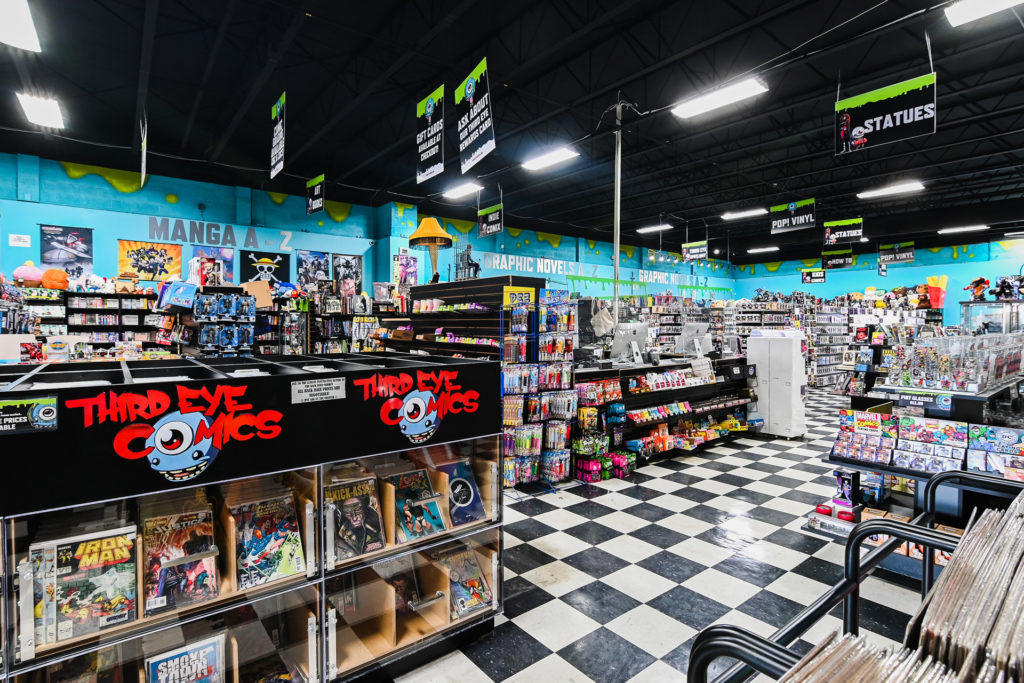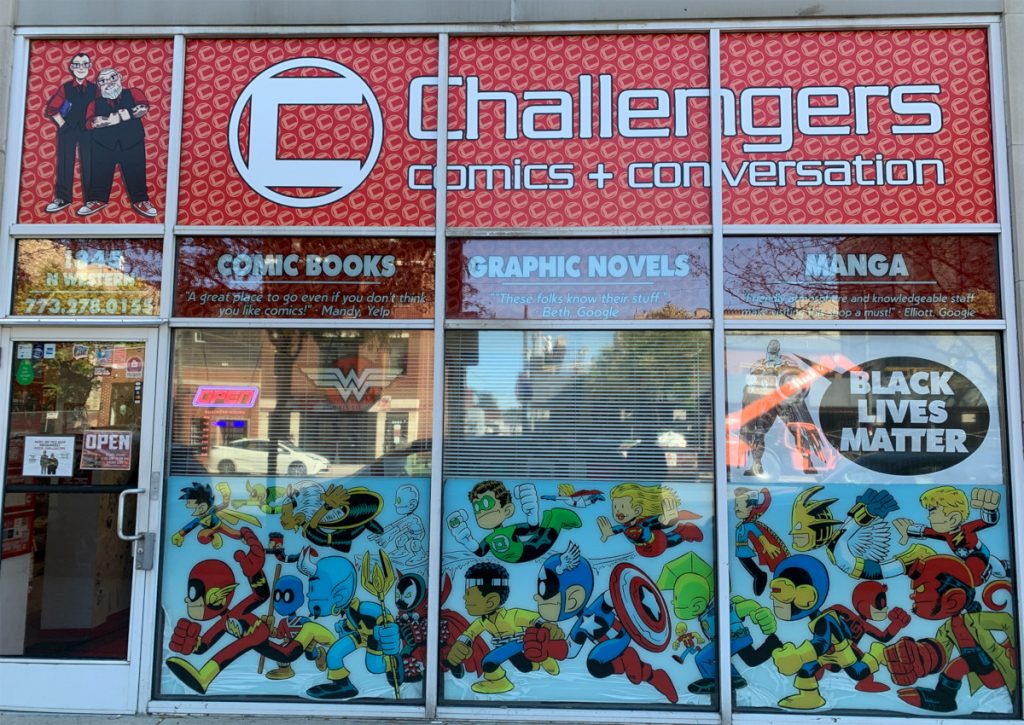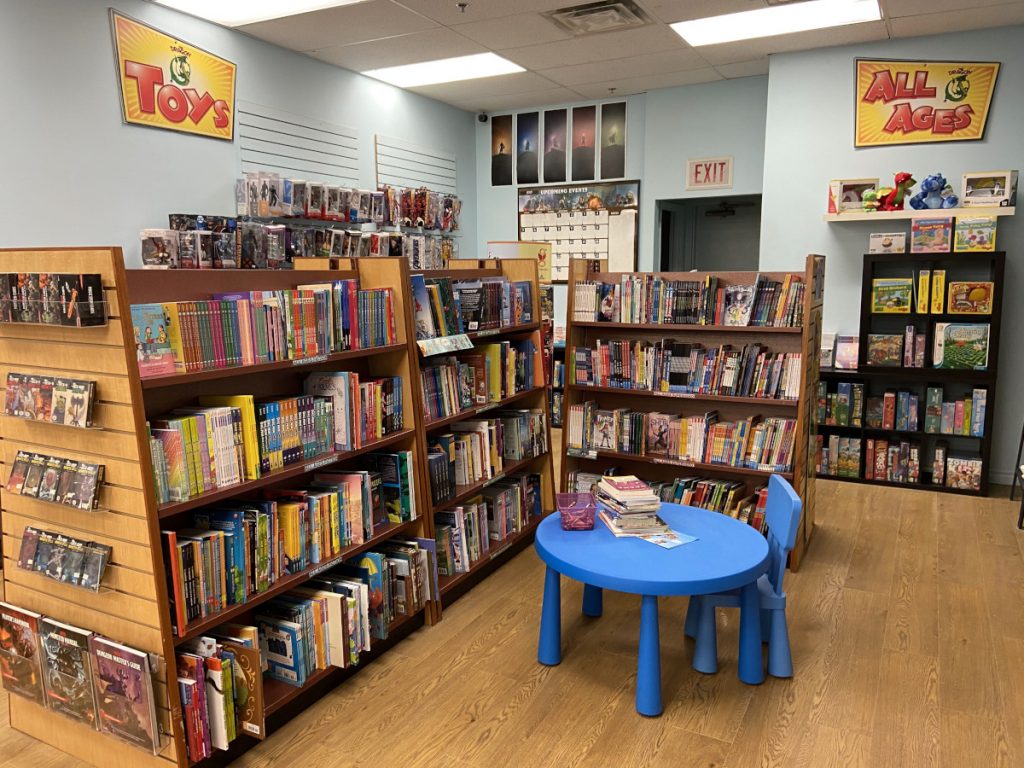The Wish List: Retailers on the Things They Really Want to Set the Direct Market on a Better Path
There has been a lot of talk of late about the challenges the direct market — aka the side of the comic industry comprised of comic shops — is facing right now. That’s for a good reason: it’s a super weird time!
Discussing the problems of the industry is a good and important conversation to have, but sometimes, it can be even more useful to talk about solutions. That’s something that has been on my mind of late when thinking of comics retail, because quite often, the concern is that there are answers available, they just aren’t being listened to. That doesn’t mean it isn’t worth talking about them, though.
That’s why I recently reached out to a bunch of retailers to do just that. While not everyone participated, I wanted to get perspective from shops about the things that could really make a difference in their world and for their peers in the direct market. More specifically, I asked them the following question.
Let’s say we live in a theoretical world where all your partners in the direct market listen completely and act on your requests when they’re founded in a place of overall value for all involved. If there was one thing you would like to see changed – and only one, whether it’s on the publisher side, distributor side, or whatever – to help set the direct market on a better path, what would it be?
As expected, the answers were quite interesting. What I didn’t expect was how different they would be from one another. It’s an interesting mix of wants, all of which are varying degrees of reasonable, at least to me, a guy who runs a comic website and podcast. We’ll see what you think, as you can read their answers below in alphabetical order by last name. Also, this article is open to non-subscribers, so if you enjoy this piece, consider subscribing to SKTCHD for more like it.

Steve Anderson, Third Eye Comics (Maryland and Virginia)
I’m sorry, but I had to give you two.
#1: Uniform product data files that are consistent and uniform across all vendors, with a defined advertised available time that is also uniform across all distributors.
This would also mean: a defined, standardized day & time each week for FINAL ORDER CUTOFF to be available, with it being 100% set: these are the FOC books, and the earlier in the week: the better, as that’s more time to market prior to FOC. In addition: having all cover art available for download / access when these files go live.
By standardizing the data & time of availability, there’s a ton of money to be saved in labor costs & simple communication errors (i.e. incorrect dates, lack of updated dates, and incorrect solicit information in general). In addition: the opportunities that could be created for retailers by standardizing this information, and creating defined timing, are huge.
#2: Much more thought put into the timing of the release of books; i.e. avoiding all of your major releases dropping on one week, or front-loading October due to NYCC, with all your big drops, and then the opposite: leaving a light week w/o any bangers at all.
Comic book reading, and purchasing, is all about the repeat visit, and the lack of thought being put into release schedules has put a hurt on that every week visit.
Bruno Batista, Big Bang Comics (Dublin, Ireland)
One thing I would love to see is an actual dialogue between publishers and retailers. There is such a disconnect between what the publishers are putting out and what customers are asking for, and retailers, as the middle person, are the ones that are on the ground and taking in the reader feedback daily. And more importantly, this is feedback from actual paying customers, not social media.
There is also a discussion that needs to be had about scheduling. For example, and I’m sure customers notice this with their wallets, there are weeks where you’ll have four huge books from a publisher, and then the next week it feels like they put out.. the rest. There is no obvious reason why the big books can’t be split through different weeks, it would lead to stronger sales for the publishers and retailers, so it would be an overall win for the market.
I’ve been told before by a publisher that this happens for a reason and they know what they’re doing but it definitely doesn’t feel that way. It’s another area where a bit of dialogue on why this happens would be beneficial.

Patrick Brower, Challengers Comics + Conversation (Chicago)
This is an excellent question, David, and I’m going to try to work my blatantly two answers into one, to fit the parameter. The easy answer is returnability. Challengers co-owner W. Dal Bush and I aren’t as hopeful in this mythical reality of yours as to be granted full returnability on every issue, so realistically what we’re asking for is this: 100% Returnability on all first issues, and that all first issues also come out at least one week before we have to FOC #2. Wait… I can phrase this better…
It is our sincerest hope that all first Issues are fully returnable and are released at least one week before the 2nd issues are FOC’d.
Can that count as one thing? One wish? One paltry request?
Anna Warren Cebrian, Illusive Comics and Games (Santa Clara, California)
Transferring/uploading a file with all the sales data/invoice data and item images to stores. Not in a Dropbox. Something that is even easier to deal with.
Jermaine Exum, Acme Comics (Greensboro, North Carolina)
I think the biggest game changing element in our perfect House of Comics Retail World that functions differently in service to all and not niche specifics would be this:
All publishers, big and small, consistently adopting and maintaining the ideology that we, the comic book retailers, are their partner. The local comic book store is their representative. Their brand advocate. The last line of endorsement between their product and the end of line consumer. We want to sell more through our businesses. A little more, a lot more. Whenever we are able to sell more, we then purchase more from our providing publishers so that we can do it again. This is the system, such as it is, working.
This goes both ways. Positive results can happen from the “if you build it, they will come” model, but it is becoming rarer and harder to truly anticipate with accurate purchase orders on the retailer end.
It is very, very easy for a publisher to look at the comic book store as their customer, not their partner. Simply put, once their product is sold to us via purchase orders that is the end of their involvement, concern, and participation. They’ll never know what became of their product once it was sold to us. That is a way to be and a mindset to have, but once retailers notice that or feel that may be what is happening, it changes their outlook on the whole enterprise as well.
Having been a retailer for now for almost 30 years, I was fortunate enough to break out of the isolation retailers can feel and attend Diamond Retailer meetings, ComicsPro meetings, etc. Through the years I’ve made excellent publisher contacts who are very open and accessible. To me on an individual basis. It would be my wish though that all retailers could have access to such contact and communication at least on a monthly basis. Not for griping, but for presentations on exactly what they need to know about a product ahead of FOC (final order cutoff). “This is what it is, this is what it will do, this is what you can say to your clientele.”
Here in the era of Zoom and other communication methods that just require a computer and time, I think that something is possible. A true and honest presentation of what the product is so that we can make informed purchase orders. Applications will vary, but a real presentation of who we may sell the product to and how. I know this is possible because I’ve participated in such presentations from Skybound. And, most importantly, to date, none of the information presented there was leaked to rumor sites. Serious retailers who are serious about business can be trusted when it comes to being as informed as possible to make good choices for their stores and clientele. Conditions for a new adoption of the sentiment of partnership are right and if all publishers seized it, we could all have a more profitable 2024.

Jenn Haines, The Dragon (Guelph, Ontario)
It’s DC going back to Wednesday on sale.
There’s a lot that happens behind the scenes that makes Tuesday on sale really bad for the industry that I won’t go into all the details about right now, but it has caused a weird situation in terms of how Lunar has to ship and pack and their timeline for shipping and packing that causes other publishers’ books to be pushed by a week in order to pack and ship DC’s books to get them out before Tuesday. And it also causes issues with FOC because FOC can’t be on Monday. If the books are going to stores on Tuesday, it has to be on Sunday.
It’s just a mess. And there are so many stores that don’t actually put the books out for sale on Tuesdays because either they’re not open on Tuesdays or…for our part, we just want it to be simple and streamlined. Wednesday is new comic day, and so we just put everything out on Wednesday. It works for my customers. I know it doesn’t work for everyone. There are some people who love Tuesday on sale for DC because it brings more people in. But that would be my one thing.
Jen King, Space Cadets Collection Collection (Oak Ridge North, Texas)
Weirdly, I think that it is something that is already being worked on. At the ComicsPRO meeting this last year, there was a data summit between publishers, distributors, comic facing POS companies and retailers. It was spearheaded by Katie Pryde, board member and owner of Eisner winning store, Books With Pictures. For many industries there is a single way that data is presented in the form of UPC codes and the info that can be gleaned from them. When that info is made available to the stores selling them and pulled over to their POS systems, its helpful for things like putting those items on store webpages for pre-order, which in turn increases sales. If that info is incomplete or incorrect, it causes a myriad of problems. The summit showed us that the publishers and distributors didn’t know about how we use the data and how important it is to have it all uniform so that it works across all of the platforms. If this is achieved we can have………wait for it……….sell-through data.
The book industry has a huge amount of info that is gleaned that was from their yearly BookScan report, which currently Brain Hibbs spends dozens of hours trying to pull things out that apply to our industry. With these new changes, our industry could be included in the BookScan report and we can use that to inform future orders, just like we do with that very incomplete info now. Example: we see that the book market sells tons of manga and YA and kids graphic novels from that report, so we carry more and more of what the customer base wants. Also, the publishers getting to see actual sell through numbers for their books will allow them to plan out future releases. It seems like such a simple thing, the uniformity of data, but in this case it just might change the industry forever.
Travis Pratt, Current Comics (Monterey and Salinas, California)
It’s hard to name just one change but if I had to pick, I’d say damn…hard to pick between less “who’s-this-for” mini-series and less damaged comics in the shipments. Both are so important but the damages for us actually have gotten a lot better in the last several months since Penguin (Random House) changed boxes again, so I guess the mini-series thing is best for the industry.
Thanks for reading! If you enjoyed this piece, consider subscribing to SKTCHD for more like it.
